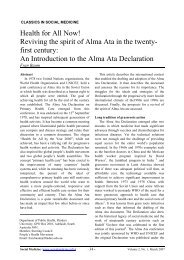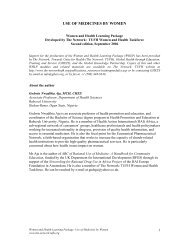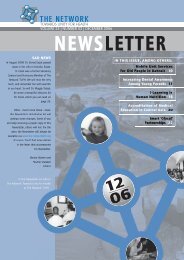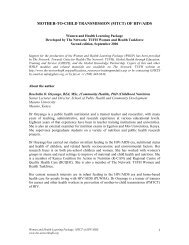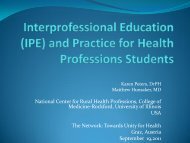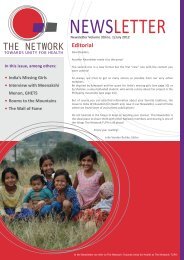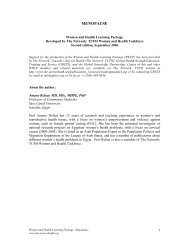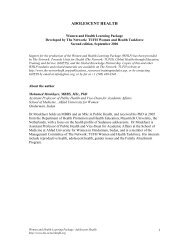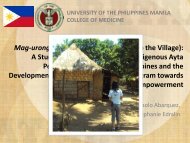Tamas Fülöp Award - The network - Towards Unity For Health
Tamas Fülöp Award - The network - Towards Unity For Health
Tamas Fülöp Award - The network - Towards Unity For Health
You also want an ePaper? Increase the reach of your titles
YUMPU automatically turns print PDFs into web optimized ePapers that Google loves.
Interprofessional Education:<br />
A Personal Perspective<br />
Interprofessional education (IPE) has been<br />
only minority educators have dared to<br />
described in as many ways as there are<br />
engage in IPE while the rest still wallow in<br />
attempts to implement it. <strong>The</strong> most recog-<br />
their singular, isolated professional prac-<br />
nised definitions, particularly for European<br />
tice. <strong>The</strong> majority ridicule those who try to<br />
and Western countries, have been sum-<br />
look for answers of complex healthcare from<br />
marised in a report by Della Freeth et al. on<br />
a broader interprofessional perspective.<br />
A critical review of the evaluation of<br />
Consequently, the general consensus among<br />
Interprofessional Education commissioned<br />
those who have accepted IPE as a future<br />
by learning and teaching Support Network<br />
reality is that it is still far from solving the<br />
<strong>Health</strong> Sciences and Practice from the<br />
real challenges of complex healthcare issues<br />
Interprofessional Education Joint Evaluation<br />
Professor Ratie Mpofu<br />
such as mental health, HIV/AIDS pandemic<br />
published in May, 2002. It emphasises<br />
and health promotion in general.<br />
shared problem solving and collaborative<br />
common site for interprofessional clinical<br />
decision making particularly in complex<br />
practice or a service learning module has to<br />
My personal experience is that for IPE to<br />
health problems.<br />
In Africa and other underdeveloped countries,<br />
lack of qualified personnel, limited<br />
professional programmes, sparse health<br />
facilities, increase of pandemics such as<br />
HIV/AIDS and the continuing challenges of<br />
poverty as well as political struggles, have<br />
forced professionals to work together and to<br />
be multi-skilled. <strong>Health</strong>care professions in<br />
developing countries have no luxury of specialisation.<br />
In most cases, the only available<br />
healthcare practitioner may be a nurse who<br />
is expected to know about all health needs<br />
of clients. <strong>The</strong> challenge therefore is to<br />
equip one health practitioner with all skills<br />
required for care of not only one individual,<br />
but also of eradicating preventable diseases<br />
in partnership with other professionals and<br />
lay persons.<br />
Attempts to train generic workers have had<br />
little success, and more recently, IPE has<br />
be developed since objectives are seen to<br />
overlap more in practice than in theory.<br />
<strong>For</strong> IPE to succeed, there should be an<br />
understanding of why professionals should<br />
learn together. Sharing an anatomy class<br />
may be cost effective, but may not produce<br />
interprofessional collaboration. <strong>The</strong> students<br />
from different professions have to<br />
critically review why they should sit in one<br />
class, learn the same material or attend to<br />
the same client. In trying to answer these<br />
questions, students may discover the<br />
amount of overlapping knowledge, both<br />
theoretical and practical, coupled with the<br />
strength of each professional expertise<br />
which they will require to practice collaboratively.<br />
In most cases, this overlap of knowledge<br />
has kept professionals apart, emanating<br />
into professional and protective professional<br />
acts, which in some cases do not<br />
allow for interprofesional practice. <strong>The</strong> professional<br />
boards often set learning out-<br />
succeed the following should be taken into<br />
consideration: development of core courses<br />
combining theoretical and practical knowledge;<br />
designation of sites for collaborative<br />
practice with generic educators or supervisors;<br />
the involvement of lay persons, e.g.<br />
communities in developing the curricula<br />
and student supervision; a generic assessment<br />
system for students; analytical teaching<br />
methods allowing for sharing of ideas<br />
among the different profession.<br />
Those who have attempted interprofessional<br />
education will agree that challenges<br />
include finding a common depth of knowledge,<br />
synchronising curricula and timetabling<br />
difficulties as well as developing<br />
common method of assessment of learning<br />
outcomes.<br />
<strong>For</strong> all professions to learn together for the<br />
benefit of the clients and communities they<br />
serve, changes have to be made at curricula<br />
J U L Y 2 0 0 8 N E W S L E T T E R N U M B E R 0 1 | V O L U M E 2 7<br />
been seen as an acceptable alternative<br />
comes and competences in line with their<br />
and professional attitude level. Finally, the<br />
since it does not challenge professional<br />
international partners without reference to<br />
willingness to analyse and participate in<br />
identity. IPE requires several approaches,<br />
the growing interprofessional practice need-<br />
this process no matter what profession one<br />
such as more than one profession learning<br />
ed for comprehensive healthcare in under-<br />
comes from is the key to the success of IPE.<br />
together using the same learning materials,<br />
developed countries.<br />
tutors and time tables with the aim of<br />
Ratie Mpofu | Dean, Faculty of Community<br />
achieving the same goals. <strong>The</strong> assumption<br />
More recently, the definitions of interprofes-<br />
and <strong>Health</strong> Sciences, <strong>The</strong> University of the<br />
is that there is generic knowledge and skills<br />
sional practice and collaborative practice<br />
Western Cape, South Africa<br />
which each profession should have, without<br />
have been addressed by the WHO Working<br />
Email: rmpofu@uwc.ac.za<br />
losing professional identity. Further, a<br />
Groups, of which I am a member. However,<br />
19



